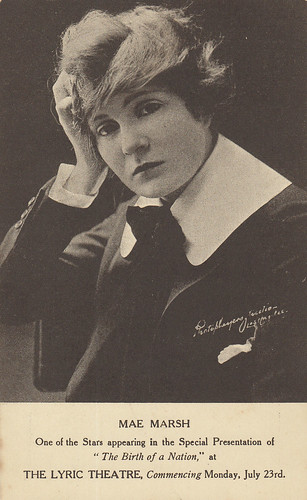
Swedish postcard by Nordisk Konst, Stockholm, no. 916. Collection: Marlene Pilaete.

British postcard by Lilywhite Ltd. in the Cinema Stars series, no. C.M. 13. Photo: Stoll.

British postcard advertising The Birth of a Nation (David Wark Griffith, 1915), ca. 1917. Collection: Marlene Pilaete.
D.W. Griffith
Mary Wayne (Mae) Marsh was born in Madrid, New Mexico Territory, USA, in 1894. She was one of five children of bartender Charles Marsh and Mary Wayne Marsh. All her siblings would later have a film career: editor Frances Marsh, actresses Marguerite Marsh and Mildred Marsh, and cinematographer Oliver T. Marsh. After the death of her father, her mother remarried oil-field inspector William Hall.
The family moved to Los Angeles in the hope of breaking into the film world. Marsh worked as a salesgirl and loitered around the sets and locations while her older sister, actress Marguerite Marsh, worked on a film, observing the progress of her sister’s performance.
She started to work as an extra in various silent shorts of the Biograph Studios. One day the 15-years-old was noted by director David Wark Griffith. He gave her her first substantial part in the short silent drama Ramona (D. W. Griffith, 1910), in which Mary Pickford played the title role.
Mae also owed her breakthrough to Mary. Pickford, resident star of the Biograph Company and married at that time, refused to play the bare-legged, grass-skirted role of Lily-White in Man's Genesis (D. W. Griffith, 1912), which then went to Marsh. Director D.W. Griffith was fed up with Pickford's behaviour and used Marsh regularly afterward in films for which Pickford was potentially eligible. He fired Pickford from The Sands of Dee (D. W. Griffith, 1912) and gave Marsh the lead role instead.
Marsh was regularly cast opposite Robert Harron and Lillian Gish. She also had roles in Griffith's features Judith of Bethulia (D. W. Griffith, 1914), The Birth of a Nation (D. W. Griffith, 1915), and Intolerance: Love's Struggle Throughout the Ages (D. W. Griffith, 1916), among others. Her parts of the little sister of Lilian Gish in The Birth of a Nation, and the Dear One in Intolerance, the woman whose child is taken away by puritan elite women after her man is condemned for a murder he didn't do, are among the most memorable roles of her film career.

British postcard in the Pictures Portrait Gallery by Pictures Ltd., London, no. 163.

British postcard by Cinema Chat. Photo: National / Goldwyn.
John Ford
After Intolerance (1916), Mae Marsh signed a contract with Samuel Goldwyn for $2,500 a week - far exceeding the $35 per week she got in 1915. Goldwyn was at his best when it came to publicity. It was he who gave Mae the title "The Whim Girl". The films she made at Godwyn never achieved the success that Griffith's films did. In 1918 she married Louis Lee Arms, a publicity manager of Goldwyn, and reduced her roles to about one per year. Her last film with Griffith was the touching - and unjustly neglected - melodrama The White Rose (D.W. Griffith, 1923), with Ivor Novello.
In the 1920s Mae Marsh went to Europe, where she was mainly active in Britain, but she also did in Germany the film Arabella (Karl Grune, 1924) starring Alfons Fryland, and Fritz Rasp. She re-teamed with Ivor Novello for the film version of his hit stage play The Rat (Graham Cutts, 1925). In 1925, she stopped acting in silent films.
Mae Marsh returned to the screen after the emergence of the sound film in 1928. Like many others, she was wiped out financially by the Wallstreet Crash. Her roles were smaller now. She played character roles in Rebecca of Sunnybrook Farm (Alfred Santell, 1932) as Aunt Jane, and Drums Along the Mohawk (John Ford, 1939).
She became a favourite of director John Ford, appearing in The Grapes of Wrath (1940), How Green Was My Valley (1941), My Darling Clementine (1946), 3 Godfathers (1948), Fort Apache (1948), The Quiet Man (1952), The Sun Shines Bright (1953), The Searchers (1956), Sergeant Rutledge (1960), Two Rode Together (1961) and Donovan's Reef (1963).
During the 1940s her films included include The Song of Bernadette (Henry King, 1943), Jane Eyre (Robert Stevenson, 1944), Leave Her to Heaven (John M. Stahl, 1945), Miracle on 34th Street (George Seaton, 1947), The Snake Pit (Anatole Litvak, 1948), and A Letter to Three Wives (Joseph L. Mankiewicz, 1949).
During the 1950s, she appeared in such films as Titanic (Jean Negulesco, 1953), A Star Is Born (George Cukor, 1954) and the Western The Tall Men is a (Raoul Walsh, 1944). In 1955, Marsh was awarded the George Eastman Award, given by George Eastman House for a distinguished contribution to the art of film.
Her last part was in John Ford's epic Western Cheyenne Autumn (1964). Four years later, Mae Marsh passed away in Hermosa Beach at the age of 73. She and Louis Arms had three children. They were married until her death in 1968. Louis Arms died in June 1989 at age 101. They are buried together in Section 5 at Pacific Crest Cemetery in Redondo Beach, California.

British postcard by Picture Show in the Film Star Series, no. 1.

British postcard in the Picturegoer Series, London, no. 11.

Dutch postcard, no. 264. Photo: Fox Film. Mae Marsh and her daughter Mary.
Source: Wikipedia (Dutch and English) and IMDb.
No comments:
Post a Comment